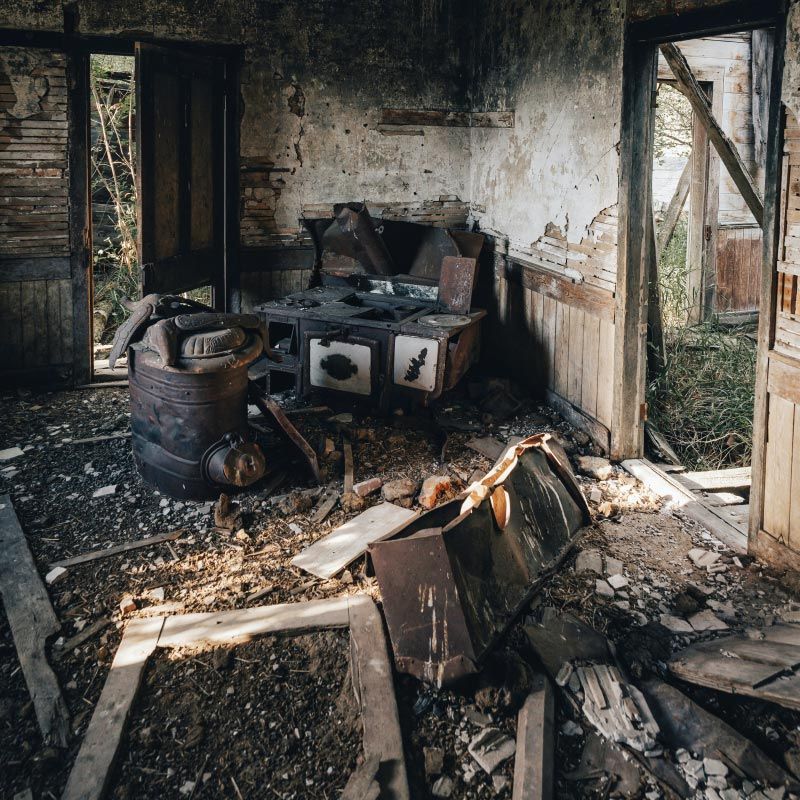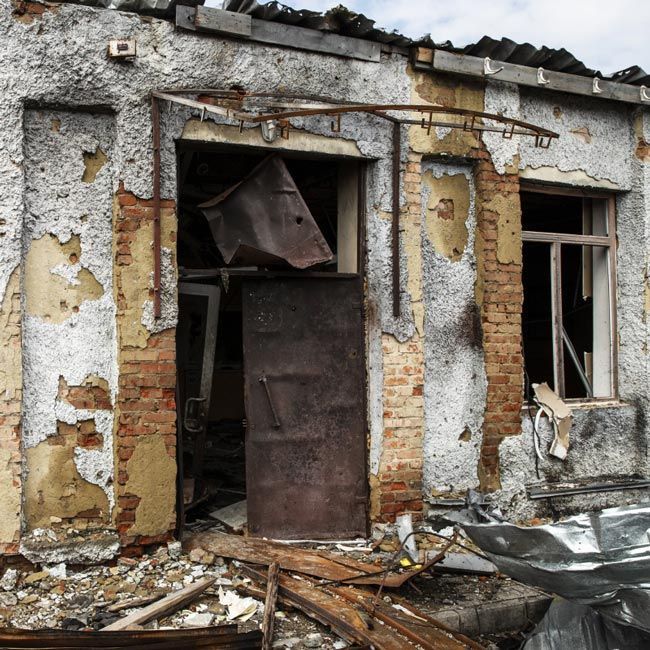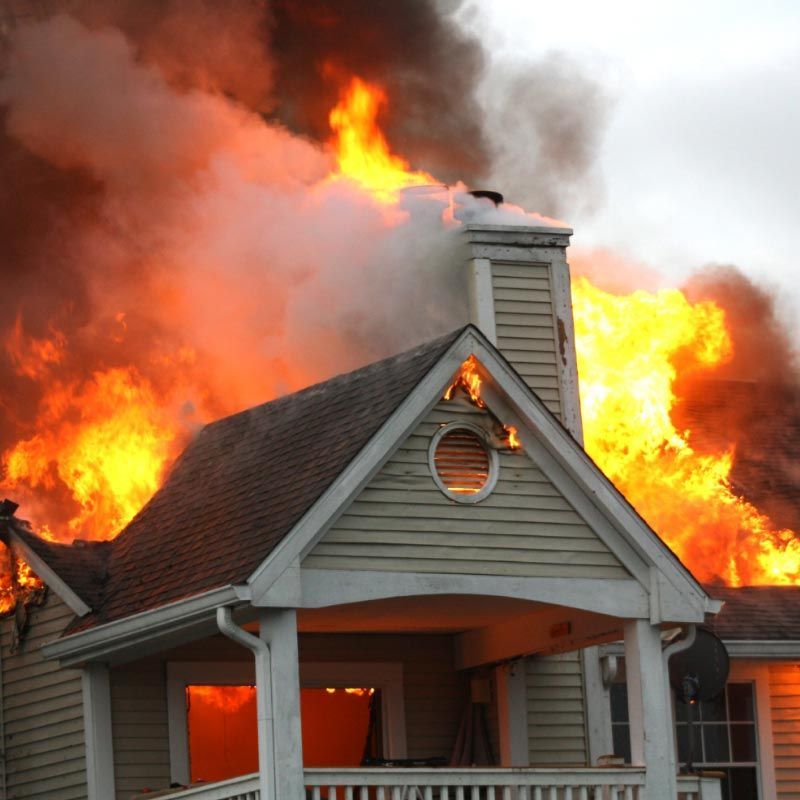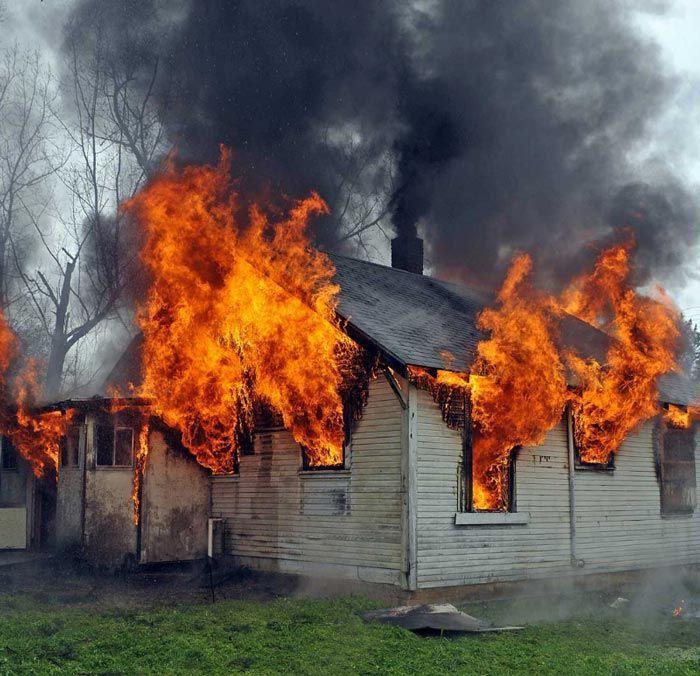Rebuilding a House After a Fire: 8 Tips for Homeowners
Free Offer Form
We will get back to you as soon as possible.
Please try again later.
Selling a fire damaged house is possible, though may be difficult with a real estate agent. Selling as-is to a National cash buyer is one of the best options. Fill out the form below to get started and find out what your property is worth.
Navigating the Aftermath of a Fire
Rebuilding a fire-damaged house requires patience, determination, and careful planning.
The psychological impact can be overwhelming. Remember to seek support and care for your mental well-being.
Work with your insurance agent to streamline the rebuilding process.
Psychological Impact and Readiness to Rebuild
The aftermath of a house fire isn't limited to physical damage. For many, it takes a toll on their emotional well-being too.
The first step to rebuilding is acknowledging that your fire-damaged house has psychologically impacted your life.
We highly recommend you find help after experiencing a house fire. Take counseling or therapy to cope with feelings of loss and anxiety.
Contact your loved ones for emotional and practical support during this challenging time.
And before considering rebuilding, pause and assess whether you're ready.
When it's time to rebuild, take it one room at a time. Ensure you have a stable living arrangement and the financial means to complete the restoration.
Contacting Your Insurance Provider
After a house fire, ensure you contact your insurance provider as soon as possible. Many insurance companies cover restoration and replacement costs for fire-damaged homes.
Here's what to do.
- Contact your home insurance provider as soon as possible after the fire. They'll guide you through the claims process and inform you of the documents needed.
- Contact your insurance agent about bringing in a licensed professional fire restoration contractor. Your agent and restoration contractor can determine whether you need rebuilding or not.
- Understand your homeowners' policy to learn if you have sufficient insurance coverage. Work with your insurance adjuster to determine the extent of the damage and the estimated rebuilding cost.
Keep a record of all interactions with your insurance company.
This includes the names of representatives you speak with and the details of your conversations. This record will help you avoid discrepancies or misunderstandings.
Can I Sell a Fire Damaged House National?
Yes. You can sell a fire-damaged house. However, it may be harder to sell in the local National real estate market in as-is condition. You would have to make repairs and possibly rebuild most parts of your house before a buyer takes interest in the property. Your best option when selling a fire-damaged house is a cash buyer. They buy burned houses as-is so you don't need to spend money on repairs. They'll handle all the cleanups and renovations for you, however, expect that their offer may be below the cash value of your property.
Tip 1. Initial Damage Assessment and Cleanup
The first step in rebuilding is to assess the extent of the damage and begin cleanup.
Adopt a systematic approach to ensure no critical details are overlooked.
Bringing in a Fire Damage Assessment Expert
A fire damage assessment expert is crucial to evaluate the impact of the fire on your property. They should be able to determine the cost of fire damage restoration too.
A fire damage assessment expert will scrutinize the following:
- Structural components' integrity
- Air quality within the house
- Doors, windows, and frames
- The roof
- Plumbing fixtures
- Wiring, electrical circuits, and switches (Electrical Systems)
- Furnace, water heaters, and sump pumps (Mechanical Systems)
- Heating, ventilation, and air conditioning (HVAC) system
- Light fixtures
- Fans
- Metal structures
- Concrete siding
- Stucco flooring, interior walls
- Other areas damaged by fire, soot residue, hazardous chemicals, smoke stains, or moisture that are susceptible to mold growth
Cleaning Up and Salvaging Your Property
Visiting your home after a fire can be emotionally challenging. However, finding salvageable items is part of moving forward.
You can begin the detailed process for post-fire cleanup with help from fire restoration companies.
Here are some tips you can follow.
- Ensure your property is safe to enter. Structural damage and lingering hazards might pose entry risks.
- Identify salvageable items. Prioritize sentimental valuables like documents and photographs. Take this one room at a time.
- Engage certified restoration technicians specializing in fire damage. These experts are trained to remove debris, soot, and odors without causing further damage. A restoration company can even replace ruined sheetrock and drywall and restore fire-damaged floors.
- Properly dispose of severely damaged items and potential health risks. Consult local regulations and waste management services for guidance.
- Use air purifiers to ventilate your property. Fires can affect indoor air quality due to smoke and soot.
- Take photographs and videos as evidence. Documentation is crucial after house fires. This will support your insurance claim and ensure you're compensated properly.
Tip 2. Considering the Foundations
The foundation's integrity determines the safety and longevity of a structure. This makes it a top priority when rebuilding fire-damaged homes.
Evaluating Existing Foundations
Hire a structural engineer to appraise the severity of your structural damage. They'll determine if the foundation can be salvaged, renewed, or requires structural repairs and reinforcements.
Their evaluation involves:
- Inspecting visible and hidden damage - Cracks, settling, and shifts in structural components can indicate issues.
- Testing soil stability and load-bearing capacity - This ensures the foundation can support the rebuilt structure's weight.
Renewing or Reinforcing the Foundations
Structural repairs in a fire-damaged home are crucial for safety. Only a restoration company and structural engineers should handle these heavy repairs.
This may involve repairing the attic, replacing damaged trusses and floor joists, and securing the interior framework.
You'll have to decide whether to renew or reinforce the existing foundation to meet safety standards after fire restoration. Factors influencing this choice include:
- Foundation Material - Your existing foundation's material plays a role. Concrete, for instance, can often be repaired, while severely damaged masonry may necessitate rebuilding.
- Renewal - If the foundation has sustained minimal damage, renewal might involve sealing cracks, resurfacing, or stabilizing minor settling.
Reinforcement - Foundations that have sustained substantial damage may require additional reinforcement. This could involve adding steel supports or pilings to enhance stability.
NOTE: Big or small fires can leave behind soot residue, smoke stains, smoke odors, water damage, and contaminated air ducts. Your restoration contractor should also handle this smoke damage and any specialized cleanup work.
The Process of Selling Fire Damaged Property to a Cash Buyer
The process of getting a cash offer for a burned house is pretty much the same as any property type. However, it is best if you can contact your home insurance company first before getting an offer for your house after a fire. Your National home insurance company can help assess the extent of the fire damage as well as the repair costs. This can help you decide whether selling a house as-is to a cash buyer is really the right path to take. Once you have decided that you really want to get a cash offer, here are the next steps you should take.
Important note: This doesn't apply to all cash buying companies.
1. Request a Cash Offer
You can easily find cash buyers in your National area by searching online. Once you found a reputable cash buyer, head over to their website to fill out a form or give them a call to ask for a cash offer. Most cash buyers and real estate investors give no-obligation cash offers so you can still ask other cash buying companies how much they can buy your fire-damaged property. If you are unsure about the background of a cash buyer, you can always ask them for proof of their source of funds.
2. Welcome the Cash Buyer into Your Home
The cash buyer or real estate investor may want to check your fire-damaged property for the repairs and improvements it needs, especially its roofing, walls, foundation, etc. You won't have to pay for these repairs when selling a National house to them, but experienced home buyers or real estate investors consider repair costs to make an accurate cash offer.
3. Review the Contract and Sign
Once you accept the cash buyer's offer on your fire-damaged home, they would furnish a sales contract and send it to you electronically. You will be given time to go over the terms and ask questions. After everything is settled, sign the contract to make the deal with the National cash home buyer official.
4. Closing
During closing, expect less paperwork since there are no lenders involved. After you have signed the minimal necessary paperwork and the National deed is transferred to the cash buyer's name, you'll get your cash in your bank account. If you aren't confident attending the closing by yourself, bring a real estate attorney with you.
5. Set Your Preferred Day to Move-Out
If the property has minor fire damage and you are still living in it, communicate to the cash home buyer when you want to move out. This is also a good time to ask for a sale-leaseback agreement if you don't have a place to crash on while you are still looking for a new National home.
Tip 3. Rebuilding a House After a Fire: The Process Unveiled
A fire-damaged house renovation requires careful planning, precise execution, and a vision for the future. Here are the steps for recovering after a fire to begin the recovery process:
Hiring the Right Contractors
For fire damage restoration, it's crucial to hire contractors that match your needs and budget.
The fire damage restoration contractor will partner with a structural engineer for the job. They'll cooperate to restore the basement, second floor, attic floor joists, interior load-bearing walls, foundation, and basement walls, among other tasks.
The restoration contractor will also contact licensed carpenters and electricians to work on your project.
The right team can make the necessary repairs while following safety regulations. When hiring contractors, consider the following.
- Find contractors who are experienced in fire restoration and home construction.
- Seek referrals from friends, family, or online reviews.
- Verify if every restoration contractor's team member is licensed, insured, and bonded. This ensures they meet industry standards and can handle potential challenges.
- Request examples of their previous work, especially projects involving rebuilding fire-damaged homes.
Designing Your New Home and Obtaining Permits
After fire restoration comes designing your new home. Create a space that suits your needs and preferences while adhering to local regulations.
In this final phase, you will:
- Collaborate with architects or designers to design a home that meets your aesthetic and practical requirements, along with your budget and local building codes.
- Select resilient and aesthetically pleasing materials. Remember that certain materials may be more fire-resistant, adding an extra layer of safety.
- Obtain the necessary building permits from local authorities before beginning. These will ensure your project adheres to zoning regulations, building codes, and safety standards.
- Submit your design plans to the relevant authorities and wait for approval. Your plan may require revisions and adjustments to meet the requirements.
Tip 4. Financing the Rebuilding Process
Rebuilding a fire-damaged property requires significant financial resources. That makes handling your house fire insurance payout crucial for a smooth reconstruction.
Insurance Claim Process
When rebuilding your house after a fire, your homeowner's insurance policy is your lifeline. Your insurance carrier can help with your house fire claims process.
Here are some tips to handle your insurance claim effectively.
- Notify your insurance agent immediately after the fire.
- Document the damage thoroughly with photographs, videos, and a written description. This documentation will support your claim and provide evidence of the damage's extent.
- Your insurance company will assign an adjuster. They'll evaluate the damage and estimate the cost of repairs. Communicate openly and provide all necessary information.
- Review your insurance policy to understand what is covered and any applicable limits. Certain policies may have limits for specific damage types. Clarify the difference between replacement cost coverage and dwelling replacement cost.
- You'll receive a claim settlement offer after the adjuster's assessment. This offer contains the amount the insurance company is willing to pay for the damage.
- You may negotiate with the insurance company if the settlement offer appears insufficient. Provide additional documentation, contractor estimates, and other relevant information to support your case.
Other Financing Options
If their insurance policies cannot cover the reconstruction costs of their home after a fire, property owners can cover rebuilding costs through the following.
- Personal Savings - If you have personal savings or emergency funds, use these for rebuilding.
- FEMA Assistance - Depending on the circumstances and severity of the disaster, the Federal Emergency Management Agency (FEMA) might assist with disaster-related expenses.
- Home Equity Loan or Line of Credit - If you have equity in your property, consider using a home equity loan or line of credit.
- Construction Loans - These are specifically for funding the building or rebuilding of a home.
Community Support - Sometimes, communities, nonprofit organizations, or local government agencies might offer financial assistance to help homeowners recover from disasters.
Tip 5. Estimating the Time Duration Required to Rebuild
The timeline of restoring a house after a fire can be influenced by the following.
- Damage Extent - The severity of the damages directly impacts rebuilding time. Extensive damage requires more repair time.
- Design and Planning - Crafting a new design, obtaining permits, and finalizing construction plans can take several weeks or even months, depending on the project's complexity.
- Contractor Availability - The availability of contractors and skilled laborers can be influenced by seasonal demand.
- Material Availability - Procuring building materials might take time.
- Unforeseen Issues - These could range from hidden damages to inspection issues.
- Scope of Work - The complexity of the rebuild can also impact the time required.
Tip 6. Addressing Electrical Safety Concerns
Electrical safety is paramount when rebuilding a fire-damaged property. Fires can damage a home's electrical system, leading to potential hazards.
- Professional Inspection - Engage a licensed electrician to inspect the electrical system and the extent of the fire damage. A licensed electrician can detect potential safety risks.
- Full Wiring Assessment - If the wiring is compromised, replacing or upgrading the electrical system might be necessary, including a new breaker box or wiring to meet safety codes.
- Safety Upgrades - Make safety upgrades like installing ground fault circuit interrupters (GFCIs), surge protectors, and smoke detectors.
Tip 7. Environmental Considerations and Energy Efficiency
After a fire, it's essential to prioritize energy efficiency while rebuilding. Here's how.
- Opt for eco-friendly and sustainable building materials for reduced environmental impact and long-term sustainability.
- Incorporate energy-efficient features into your new design, like energy-efficient appliances, well-insulated windows and doors, and HVAC systems designed for optimal energy consumption.
- Consider incorporating solar panels to reduce long-term energy costs.
Tip 8. Rebuilding in a Disaster-prone Area: Special Considerations
If your area is prone to natural disasters, consider the following.
- Design with disaster resilience in mind. This could involve reinforced foundations, impact-resistant windows, and fire-resistant building materials.
- Familiarize yourself with local building codes and regulations that pertain to disaster-prone areas. These codes often specify requirements for structural integrity and safety.
- Develop emergency plans that outline procedures for evacuation, sheltering in place, and communication in case of future disasters.
Frequently Asked Questions
Learn more about rebuilding a home after a fire.
Is It Safer to Rebuild or to Relocate After a House Fire?
Whether you experienced a big or small fire, the decision to rebuild or relocate depends on factors like the extent of the damage, insurance coverage, and your financial situation.
Consult professionals to assess the structural integrity of your fire-damaged home.
How Long Generally It Takes to Rebuild a Burnt-Down House?
The time it takes to rebuild a burnt-down house can take several months to a year or more.
What Precautions Should I Take Care While Rebuilding?
While rebuilding, take the following precautions:
- Prioritize safety during construction.
- Work with experienced professionals, including architects, contractors, and engineers.
- Ensure the rebuild adheres to local building codes and regulations.
- Choose durable and fire-resistant materials that align with safety standards.
- Schedule regular inspections to ensure that the construction is proceeding according to plan and meeting safety requirements.
- Document all interactions, permits, contracts, and receipts related to the rebuild.
How Can I Ensure My House Is More Fireproof in the Future?
To make your house more fire-resistant:
- Fire-Resistant Materials - Use fire-resistant materials for roofing, siding, and windows.
- Defensible Space - Create a defensible space by clearing vegetation and combustible materials near your property.
- Firebreaks - Design your landscaping with firebreaks to halt the spread of flames.
- Fire-Safe Roofing - Choose non-combustible or fire-resistant roofing materials.
- Ventilation and Eaves - Install spark-resistant vents and cover eaves to prevent ember entry.
What Should I Look For in a Contractor for Rebuilding?
When selecting a contractor to rebuild your home after a fire, look for the following.
- Experience - Choose a contractor with a proven track record in fire damage restoration and construction.
- Credentials - Verify their license, insurance, and bonding.
- References - Ask for references and view past projects to assess their work quality.
- Communication - Ensure the contractor communicates effectively and addresses your concerns.
- Transparency - Obtain detailed written contracts that outline the scope of work, timelines, and costs.
By considering these factors, you can make informed decisions and ensure a successful restoration after a house fire.
Conclusion
We understand that rebuilding a house after a fire can be a challenging journey. It requires careful planning, resilience, and informed decision-making.
By following the tips we mentioned above, we hope you can create a home that not only stands resilient against future challenges but also offers a place of comfort, safety, and renewal.
National Resources
- Selling a Fire Damaged House National
- Selling Inherited Property National
- Selling a House in Probate National
- How to Sell a House by Owner National
- How to Sell Rental Property National
- Stop Foreclosure National
- Selling a House during Divorce National
- How to Sell a Hoarder House National
- Can You Sell a Condemned House National?
- Can You Sell a House in Foreclosure National?
- How to Sell Rental Property with Tenants National
- Taxes on Selling a House National
Free Offer Form
We will get back to you as soon as possible.
Please try again later.
Author: Chris Charles
We buy fire damaged houses because we like taking on the challenge and making a win win for sellers looking to sell. We work with our partners nationwide and are experienced in dealing with the city if its already been condemned. Request a cash offer to have a chat with us today.
Sell Fire Damaged House for Cash Quick
Sell Your House Fast, To A Legitimate House Buying Company You Can Count On. ✔️ Free, Easy & ✔️ No Pressure Process. Find Out How We Buy Houses!
Sell Fire Damage House in California
Sell Fire Damaged House in Ohio
Sell Fire Damaged House In North Carolina
Sell Fire Damaged House In Michigan
Sell Fire Damaged House In Massachusetts
Sell Fire Damaged House In Colorado
Sell Fire Damaged House In Minnesota
Sell Fire Damaged House In South Carolina
Sell Fire Damaged House In Alabama
Sell Fire Damaged House In Louisiana
Sell Fire Damaged House In New Hampshire
Sell Fire Damaged House In Maine
Sell Fire Damage House in Texas
Sell Fire Damaged House in Florida
Sell Fire Damaged House In New Jersey
Sell Fire Damaged House In Virginia
Sell Fire Damaged House In Indiana
Sell Fire Damaged House In Kentucky
Sell Fire Damaged House In Oregon
Sell Fire Damaged House In Oklahoma
Sell Fire Damaged House In Connecticut
Sell Fire Damaged House In Utah
Sell Fire Damaged House In Rhode Island
Sell Fire Damaged House In Delaware
Sell Fire Damaged House in Pennsylvania
Sell Fire Damaged House in New York
Sell Fire Damaged House In Washington
Sell Fire Damaged House In Arizona
Sell Fire Damaged House In Missouri
Sell Fire Damaged House In Nevada
Sell Fire Damaged House In Iowa
Sell Fire Damaged House In Arkansas
Sell Fire Damaged House In Mississippi
Sell Fire Damaged House In Kansas
Sell Fire Damaged House In North Dakota
Sell Fire Damaged House In Alaska
Sell Fire Damaged House in Georgia
Sell Fire Damaged House in Illinois
Sell Fire Damaged House In Tennessee
Sell Fire Damaged House In Maryland
Sell Fire Damaged House In Wisconsin
Sell Fire Damaged House In New Mexico
Sell Fire Damaged House In Idaho
Sell Fire Damaged House In Nebraska
Sell Fire Damaged House In West Virginia
Sell Fire Damaged House In Hawaii
Sell Fire Damaged House In Vermont






